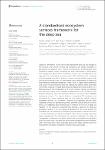A standardised ecosystem services framework for the deep sea
| dc.contributor.author | La Bianca, Giulia | |
| dc.contributor.author | Rees, Sian | |
| dc.contributor.author | Attrill, Martin | |
| dc.contributor.author | Lombard, AT | |
| dc.contributor.author | McQuaid, KA | |
| dc.contributor.author | Niner, HJ | |
| dc.contributor.author | van Rein, H | |
| dc.contributor.author | Sink, KJ | |
| dc.contributor.author | Howell, Kerry | |
| dc.date.accessioned | 2023-07-31T13:14:50Z | |
| dc.date.available | 2023-07-31T13:14:50Z | |
| dc.date.issued | 2023-05-22 | |
| dc.identifier.issn | 2296-7745 | |
| dc.identifier.issn | 2296-7745 | |
| dc.identifier.other | ARTN 1176230 | |
| dc.identifier.uri | https://pearl.plymouth.ac.uk/handle/10026.1/21095 | |
| dc.description.abstract |
Despite its remoteness, human activity has impacted the deep sea and changes to the structure and function of deep-sea ecosystems are already noticeable. In terrestrial and shallow water marine environments, demonstrating how ecosystems support human well-being has been instrumental in setting policy and management objectives for sustainable resource use. Foundational to this approach is a framework of ecosystem service (ES) classification and a synthesis of the knowledge base, which can then be used to structure decision-support tools such as ecosystem accounts or Environmental Impact Assessments. At present, no such framework exists for the deep sea. There is thus an urgent need to determine and assess the ES provided by deep-sea habitats and species before (potentially irreversible) decisions are made about deep-sea habitat use and governance. As a first step towards the incorporation of ES in such decision-making, we undertake two systematic reviews of the scientific literature based on the principles of the Preferred Reporting Items for Systematic Reviews and Meta-analysis (PRISMA) systematic process. This was to define a comparative ES framework and synthesise the current evidence base for how deep-sea habitats support ecosystem services. Our framework proposes four supporting services, three regulating services, four provisioning services and three cultural services for which there is an established and growing body of evidence for the role of deep-sea habitats. The ES framework presented here provides a structure for deep-sea ecosystem services. In its next phase of development, this could provide the foundation for the development of habitat-ecosystem service matrices, which are a critical component for truly accounting for ES in decision-making, particularly spatial management. This framework has significant implications for deep-sea management, conservation and policy, as it provides an ecosystem services-based tool that can be used in any deep-sea ecosystems management across the planet, and it also shows how critical these data gaps are for today’s decisions and how seriously they should be considered in decision-making processes. | |
| dc.format.extent | 1176230- | |
| dc.publisher | Frontiers Media SA | |
| dc.subject | deep sea | |
| dc.subject | millennium ecosystem assessment | |
| dc.subject | supporting services | |
| dc.subject | CICES | |
| dc.subject | final services | |
| dc.subject | nature's benefits | |
| dc.title | A standardised ecosystem services framework for the deep sea | |
| dc.type | journal-article | |
| dc.type | Journal Article | |
| plymouth.author-url | https://www.webofscience.com/api/gateway?GWVersion=2&SrcApp=PARTNER_APP&SrcAuth=LinksAMR&KeyUT=WOS:001002096900001&DestLinkType=FullRecord&DestApp=ALL_WOS&UsrCustomerID=11bb513d99f797142bcfeffcc58ea008 | |
| plymouth.volume | 10 | |
| plymouth.publication-status | Published online | |
| plymouth.journal | Frontiers in Marine Science | |
| dc.identifier.doi | 10.3389/fmars.2023.1176230 | |
| plymouth.organisational-group | |Plymouth | |
| plymouth.organisational-group | |Plymouth|Research Groups | |
| plymouth.organisational-group | |Plymouth|PRIMaRE Publications | |
| plymouth.organisational-group | |Plymouth|Faculty of Science and Engineering | |
| plymouth.organisational-group | |Plymouth|Faculty of Science and Engineering|School of Biological and Marine Sciences | |
| plymouth.organisational-group | |Plymouth|Research Groups|Marine Institute | |
| plymouth.organisational-group | |Plymouth|REF 2021 Researchers by UoA | |
| plymouth.organisational-group | |Plymouth|Users by role | |
| plymouth.organisational-group | |Plymouth|Users by role|Academics | |
| plymouth.organisational-group | |Plymouth|Users by role|Post-Graduate Research Students | |
| plymouth.organisational-group | |Plymouth|REF 2021 Researchers by UoA|UoA07 Earth Systems and Environmental Sciences | |
| plymouth.organisational-group | |Plymouth|REF 2021 Researchers by UoA|UoA14 Geography and Environmental Studies | |
| plymouth.organisational-group | |Plymouth|Users by role|Researchers in ResearchFish submission | |
| dcterms.dateAccepted | 2023-05-02 | |
| dc.date.updated | 2023-07-31T13:14:43Z | |
| dc.rights.embargodate | 2023-8-1 | |
| dc.identifier.eissn | 2296-7745 | |
| dc.rights.embargoperiod | forever | |
| rioxxterms.versionofrecord | 10.3389/fmars.2023.1176230 |



